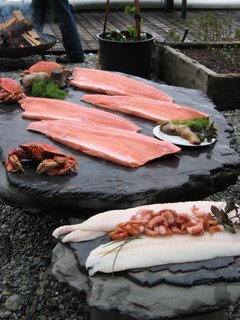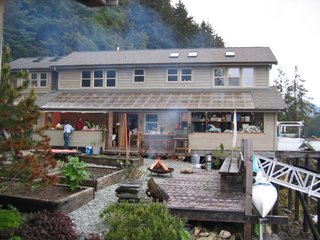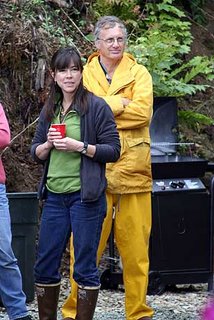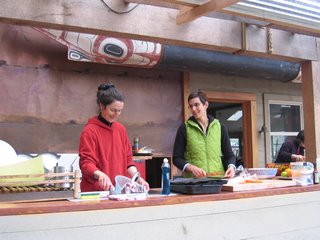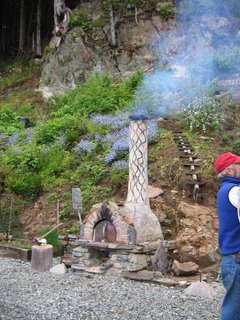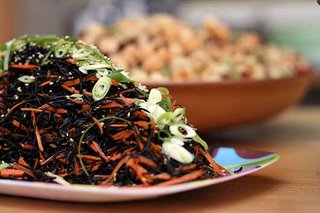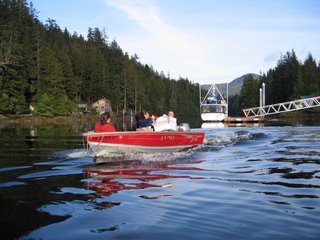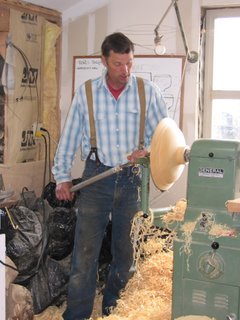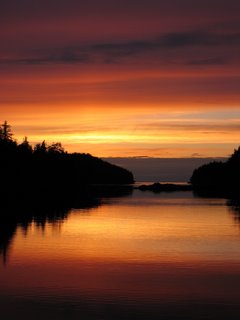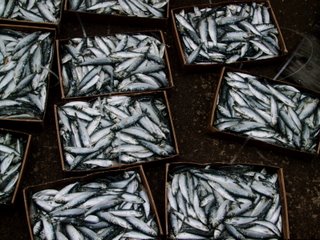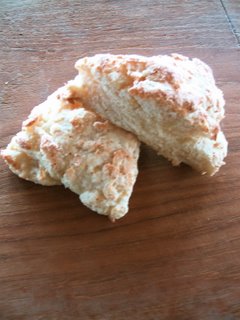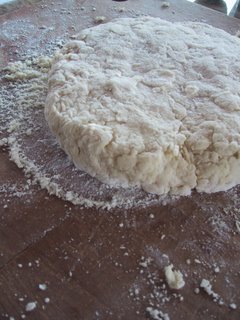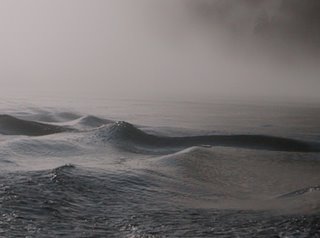Marlboro Man
 Meet the Marlboro Man, aka Tony Bourdain. He doesn't have a cowboy hat and he's way cruder than the iconic billboard figure we're familiar with. But I bet that cowboy never really chain smoked those coffin nails, unapologetically, quite the way Bourdain does. I shouldn't be telling you this, but I smoked one of his Marlboros the other night. But first I stole it.
Meet the Marlboro Man, aka Tony Bourdain. He doesn't have a cowboy hat and he's way cruder than the iconic billboard figure we're familiar with. But I bet that cowboy never really chain smoked those coffin nails, unapologetically, quite the way Bourdain does. I shouldn't be telling you this, but I smoked one of his Marlboros the other night. But first I stole it.I don't know why I did this exactly. At the time, it seemed like the right thing to do. There he was, smoking away, out on the deck, surrounded by us all, chatting us up. He left his pack and went back in the house. Then I made my move. Before you could rasp cancerstick, I had one of his cigarettes lit and I was choking it down. For posterity? As blog fodder? I sure don't know.
Why, on earth, you ponder, was I in the same house as Tony Bourdain? Because the Seattle food world is a small one. I had been home all of 24 hours from my trip to Alaska, and I had volunteered to help out some friends who were cooking a Gypsy dinner, aka Seattle's underground restaurant, for Bourdain and his crew from his Travel channel show No Reservations. My sea legs were still wobbling as I assisted in preparing the meal. Ducking cameramen and videographers, the kitchen crew crafted course after course as the evening played out perfectly.
When asked by Bourdain why most of us volunteered our time, I - emboldened by my petty thievery - said, "what? I'm not getting paid for this?"
 Above is the beautifully appointed table for 12 guests, every other person served a different 12 course menu. For you math majors, that is 24 courses of food.
Above is the beautifully appointed table for 12 guests, every other person served a different 12 course menu. For you math majors, that is 24 courses of food.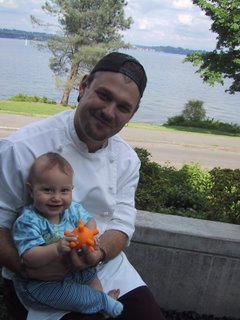 Gabrial Claycamp (and son Rhone), the chef for this Gypsy meal and the co-owner (with wife Heidi) and chef at their cooking school Culinary Communion.
Gabrial Claycamp (and son Rhone), the chef for this Gypsy meal and the co-owner (with wife Heidi) and chef at their cooking school Culinary Communion.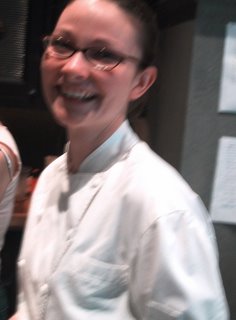 My buddy and pastry chef Dana Bickford, who crafted the incredible desserts for the meal.
My buddy and pastry chef Dana Bickford, who crafted the incredible desserts for the meal.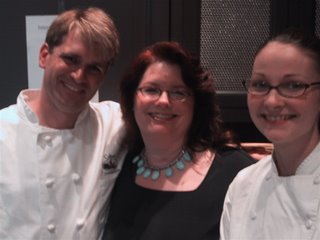 Don, Dana's volunteer assistant, Traca Savadago, aka Grand Poo-Bette of the Culinary World, who facilitated Bourdain's participation, and Dana B.
Don, Dana's volunteer assistant, Traca Savadago, aka Grand Poo-Bette of the Culinary World, who facilitated Bourdain's participation, and Dana B.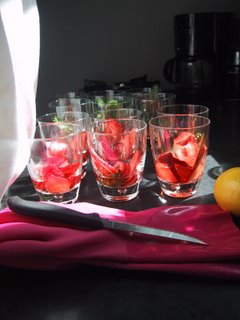 Glasses arranged, about to receive 2 different flavors of homemade "otter pops", a benediction of tequila or gin and a dry ice smoke show.
Glasses arranged, about to receive 2 different flavors of homemade "otter pops", a benediction of tequila or gin and a dry ice smoke show. The wine service was a study in glass management and was pulled off expertly by master sommelier Greg Harrington.
The wine service was a study in glass management and was pulled off expertly by master sommelier Greg Harrington.And for those of you who want more details, the menus follow below.
Menu #1
Egly Ouiret Champagne Rose NV
Watermelon Gazpacho
2004 Feudi di San Gregorio Fiano Falanghina, Campagnia, Italy
Creamy Potato Bisque with Crisp Geoduck Fritters
Three Grasses: Raw Asparagus with Bulgarian Feta, Spargel with Vinaigrette, Wild with Olive oil Sorbet and Grapefruit
2001 Mantlerhof Roter Veltliner "Selection" Kremstal, Austria
Halibut Ceviche 'Picada'
2005 Soter Yamhill Carlton District Rose
Douglas Fir, Cinnamon and Vanilla 'Otter Pop'
Tesla, Fried Marrow Sticks and Boudin Noir
2001 Sierra Cantabria "Cuvee Especial" Rioja, Spain
Pan-seared Duck Breast with Foie Gras Ravioli, Strawberry Compote, Rhubarb Gastrique, and Toasted Pine Nuts
2004 Waters Columbia Valley Syrah
Grilled Hangar Steak in Mushroom Tea, Soft Tendon, Fava Beans, Fondant Potato
2002 Pepper Bridge Walla Walla Cabernet Sauvignon
"Cheese Whiz" Whipped Epoisse with Gaufrette Potatoes and Granny Smith Apples
2004 Mission Hill "Five Vineyards" Okanagan Valley Riesling Ice Wine
Lime Cheesecake on an Aural Crust with Strawberry Sorbet
2000 Muller Catoir Mussbacher Eselshaut Rieslander Auslese, Pfalz, Germany
Lemon Sour Cream Pudding
1999 Rene Renou "Cuvee Zenith" Bonnezeaux, Loire, France
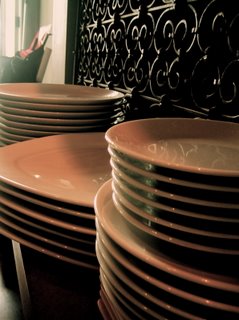
Menu #2
Egly Ouiret Champagne Rose NV
Cream of Tomato Soup with Bacon Drizzle
2004 Poet's Leap Columbia Valley Riesling
Geoduck Sashimi on Oceanic Gelee
Mache and Celery Salad with Lardo and Pancetta Dressing
2003 Villa Raiano Fiano di Avellino, Campagnia, Italy
Copper River Carpaccio with Herb Salad
2005 Soter Yamhill Carlton District Rose
Black Pepper, Tequila and Strawberry "Otter Pop"
Roasted Chicken Hearts, Duck Gizzard Confit, and Duck Prosciutto Purses
2001 Domaine du Pesquier Gigondas, Rhone, France
Truffled Braised Veal Cheeks with Morels, Braised Leeks and Pomme Puree
2004 Waters Columbia Valley Syrah
Lamb Loin "Sous Vide", Bruleed Lamb Tongues, Artichoke Bottoms, Ratatouille, Lavender Demi
2003 Pepper Bridge Walla Walla Merlot
'Fig Newton' Toasted Fig Bread with Windsor Bleu and Roasted Grapes
2003 Mission Hill "Five Vineyards" Okanagan Valley Riesling Ice Wine
Bittersweet Chocolate Terrine with a "Cluttering" of Garnishes
2003 Mas Amiel Maury Vin Doux Natural, France
Butterscotch Pudding
1999 Rene Renou "Cuvee Zenith" Bonnezeaux, Loire, France
If you are interested in learning more about becoming a guest at a Gypsy dinner, send an email to apply@gypsydinners.com and ask for an application.
CALL FOR OPINIONS: I'm thinking about keeping the name "hardtack at sea" even though technically I'm home now. What do you all think?
